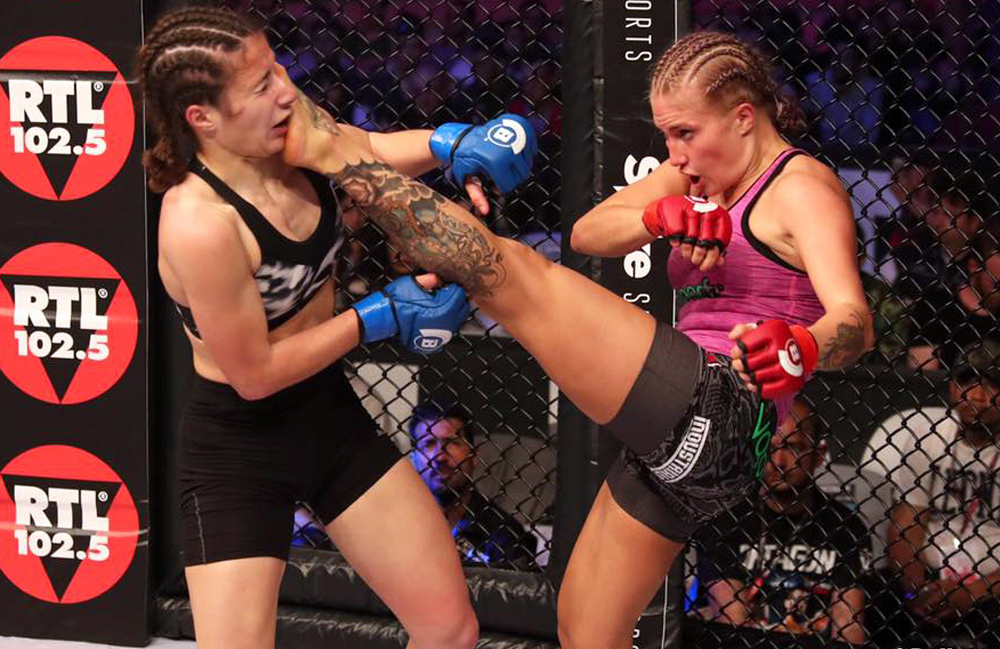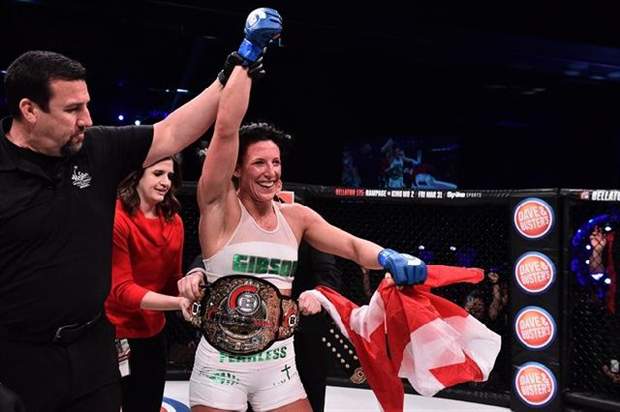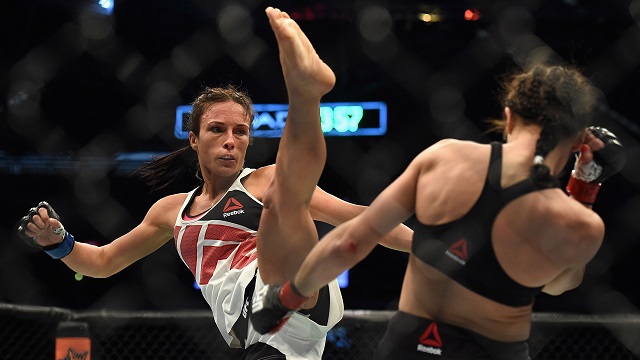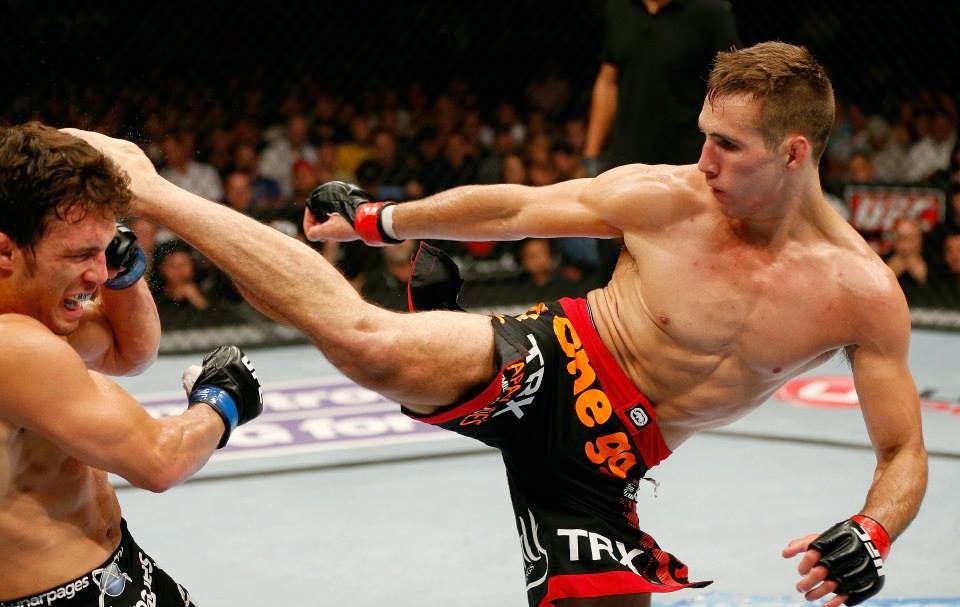Bellator MMA has been doing a lot of good things recently. The promotion’s recent flurry of signings over the past year and a half has turned the mixed martial arts world on its head, as the company who was at one point just an alternative to the Ultimate Fighting Championship has (under Scott Coker’s guidance) become a legitimate contender who may in fact be able to overtake it. Something that no one would have predicted, much less considered, is now being entertained by fans, fighters, managers, promoters, and sponsors. But what has really stood out to me is the introduction and slow build of two women’s divisions: the featherweight and flyweight divisions. The featherweight division’s launch has culminated in the crowning of a champion and the establishment of a number of legitimate, if not extremely experienced, fighters. Today we are discussing the flyweight division, and what — or more correctly who — it needs; that would be one Valerie Letourneau.
The Bellator flyweight division has made a lot of progress, as the company has brought in a lot of talent. These women aren’t necessarily experienced, nor are they established names in the mixed martial arts lexicon, but they have established records in other combat sports and are trying to translate that experience into MMA. Former Russian Muay Thai champion Anastasia Yankova and multiple-time Muay Thai world champion Lena Ovchynnikova are two examples of the direction Bellator has taken in this attempt to diversify and develop the its flyweight division. But as good of a start as this is, it presents the same problem that Bellator has had in previous attempts to develop its brand and change the image it has: the divisions being added or developed are top heavy or bottom heavy.
What I mean by that is Bellator has had a bad trend of picking up big names that draw attention and make headlines, but singular names in and of themselves aren’t enough to provide the depth needed to fill out a division. The same is true for the opposite end of the spectrum — you can’t develop a division purely on young, unproven, unfamiliar talent. In the long term youth is important, but you have to have tiers of talent, experience, and familiarity to help gauge, develop and maximize talent. I discussed some of this in Part three of my “How To Develop A Prospect” series.
Julia Budd’s crowning as the champion and face of the featherweight division is a great result for the organization, as Bellator has an experienced, skilled, physically talented fighter who is familiar to MMA fans and has a history of facing established talent, having beaten the current UFC Featherweight Champion, competed with the current UFC Bantamweight Champion, and has competed repeatedly in Invicta FC, the #1 organization for women’s mixed martial arts (which, by the way, will be the chief source of talent for the UFC’s bantamweight and featherweight divisions). That carries weight and establishes the legitimacy of the fighter, the belt, and the division, because Budd has a history and a point of reference through which fans and fighters can acknowledge the value of her technique, strategy, and physical talent.
Julia Budd did that for Bellator’s featherweight division, and Valerie Letourneau can do that for the flyweight division. Letourneau recently parted ways with the UFC, having finished with a record of 3-3, the high point being her attempt at the belt against pound-for-pound entrant and current strawweight champion Joanna Jedrzejczyk, one of the best fighters in women’s MMA, on one of the biggest cards in mixed martial arts history, UFC 193. Letourneau may not be a superstar, but she is very much established as a legitimate fighter, a fighter familiar to fans, writers, analysts, and most importantly, other fighters. A quick glance at Letourneau’s resume shows you a litany of world-class opponents in two weight classes, including Jedrzejczyk, Claudia Gadelha, Joanne Calderwood, Maryna Moroz, Sarah Kaufman, and Alexis Davis.
A fighter like Letourneau instantly increases the quality of the flyweight division and begins to establish a sense of quality that the division is currently lacking as a result of the youth and relative inexperience of the majority of the fighters taking part in it. Of more importance is the opportunity for Bellator to further establish itself as a legitimate contender to the UFC by addressing something that promotion lacks — a flyweight division, which many fighters, including Calderwood, Bec Rawlings, Tecia Torres, and the strawweight champ herself, have discussed competing in. Signing Letourneau could have the kind of impact that signing Benson Henderson had, as many fighters believe that the UFC has shown no concern for their issues with cutting weight or for the fans’ desire not to see depleted versions of world class fighters. Her signing lets the other fighters in her weight class know there is a place for them in a large North American organization, one that has made a commitment to highlighting the fighters, establishing their brands, and hopefully diversifying the appeal of Bellator while lining the pockets of the fighters with sponsorship opportunities.
In and of herself, Letourneau isn’t redefining a division or filling one out, but her inclusion will help raise the level of talent in Bellator, as well as show that the promotion is committed to bringing in the best talent and is sympathetic to the needs and desires of fighters, camps, and fans alike. If Bellator truly wants to maximize the value of the flyweight division, it needs to have a fighter who has shown herself capable of competing with and beating the best, a fighter who fans and other fighters recognize as world class, and a fighter who has a style and pedigree that will force the other flyweights to raise their own games to meet; in short, the promotion has to sign Letourneau.
Unlike a majority of the talented but unproven fighters Bellator has signed, we know Valerie Letourneau can compete with the best, we know she can compete on the biggest of stages, and we know she can and will compete with professionalism, discipline, and class in any and all circumstances. And in a sport that is known as much for fighters missing weight, underperforming, and being pushed for aesthetics as it is known for athletic accomplishments, a dependable, experienced, tough, skilled, and proven fighter is a must. Letourneau is very much who Bellator needs right now, and she is a clear example of the type of fighter the promotion will need more of moving forward.







